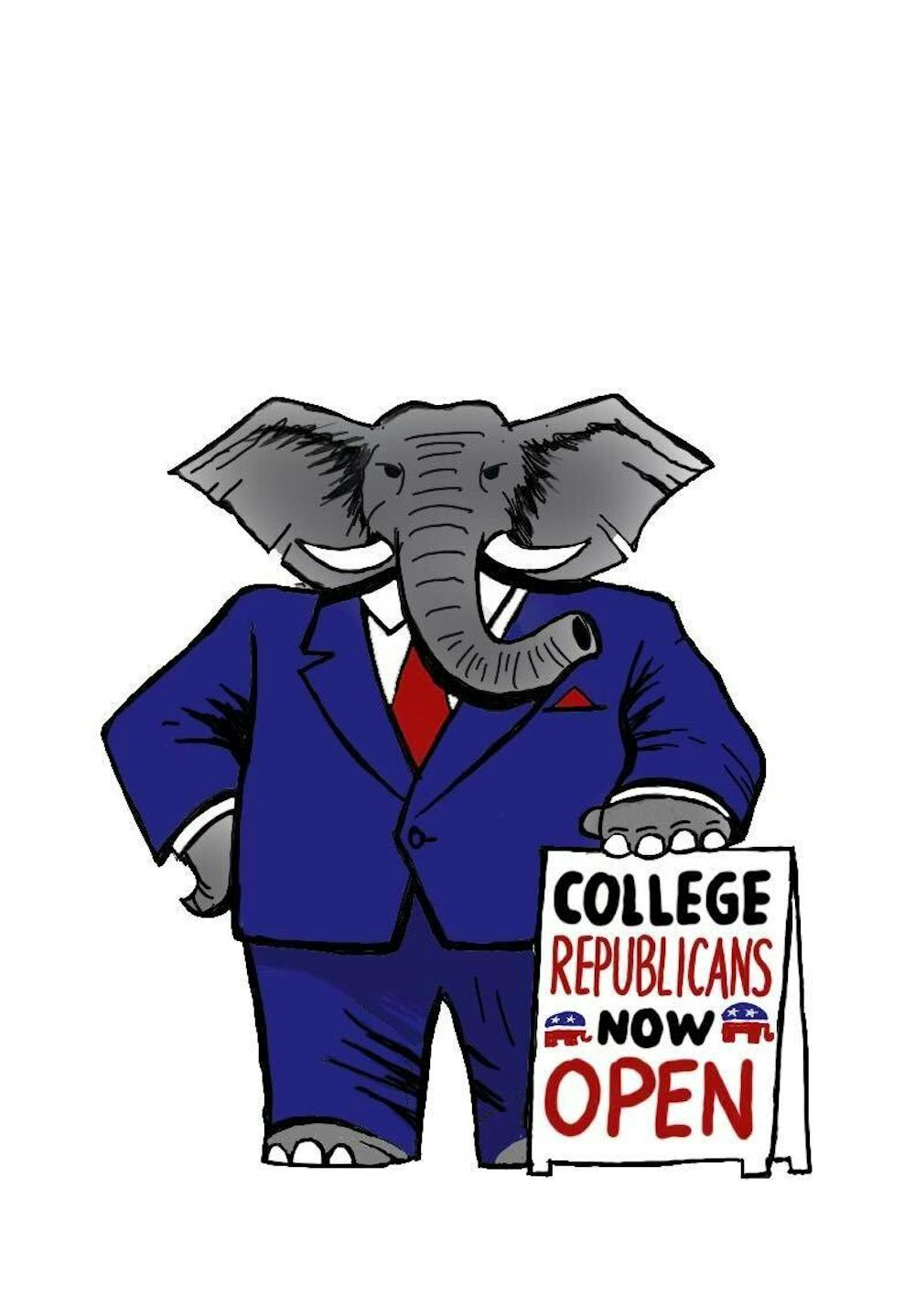Content Warning: This article contains references to sexual assault.
When Si Kai Feng (28C), who hails from Beijing, arrived at Emory University for his first semester, he was confused by the lack of a Republican presence on campus, especially compared to the robust Young Democrats of Emory.
“My understanding was this is a very politically active country,” Feng said. “It's a very politically open country with the First Amendment, and I've always been more of a Republican than a Democrat, so I wanted to join the College Republicans. … I was really surprised that there was no voice for Republican students at all.”
So, Feng decided to take matters into his own hands and restart Emory College Republicans, which was dormant last year. He is currently in the process of chartering the club and looking for new executive board members.
Years ago, the group was more active on campus, according to former College Republicans President Christian Zimm (15Ox, 17C, 20B, 20L). In an interview with The Emory Wheel last year, he noted that the club hosted speakers and events on campus during his 2016-17 presidency.
“There's actually a lot of conservatives at Emory, way more than you think, and they just are scared to speak up in class because the administration's liberal, the students are liberal, the professors are liberal, and [College Republicans] was a very nice place for people to come and speak openly,” Zimm said.
In 2016, College Republicans and Emory Young Americans for Liberty sparked controversy on campus when they hosted an event featuring former Breitbart Editor Milo Yiannopoulos in Goodrich C. White Hall. Protesters criticized the groups for inviting Yiannopoulos, as he had labeled the LGBTQ+ community and other marginalized groups as “powerful minorities,” accusing them of using their influence to “exclude” the “voiceless majority.”
Jonathan Hussung (17C) wrote an op-ed ahead of Yiannopoulos’ visit, calling the right-wing commentator a “sexist, racist, Islamophobic, transantagonistic, ableist, transmisogynistic, reactionary bigot” and condemning College Republicans for giving him a platform.
Similarly, College Republicans invited conservative author and political commentator Heather Mac Donald to speak at an event in 2020, earning backlash from student groups. Mac Donald had previously labeled “rape culture” a myth and criticized affirmative action.
In the wake of such controversies, students criticized the University for allowing potentially harmful speech that they believed could be considered void under the Respect for Open Expression Policy.
“It really could have been any Republican that came and certain student groups would have protested us and lost their mind,” Zimm said.
College Republicans has become less popular in recent years after first falling off when Zimm graduated, and the club’s Instagram has not been active since Nov. 9, 2022. Zimm expressed his hope that someone would restart College Republicans. In 2018, Ariana Gassel (22C) led a new executive board following Zimm, but the group eventually dissipated over the next few academic years. Jasmine Jaffe (22C) and Robert Schmad (23C) took over the presidential role in later years, but no one succeeded Schmad after he graduated.
“I guarantee that if the club got organized and got going again, they would be very active on campus,” Zimm said. “It's definitely possible, but it all comes down to who’s going to take the initiative.”
Feng plans on being that person. Professor of Sociology Frank Lechner, who will continue as College Republican’s advisor, noted the complicated history of the club throughout his leadership. He claimed the club was already struggling when he joined following Zimm’s tenure and cited previous attempts to reignite the chapter.
“The Emory College Republican chapter has gone through various changes in the past decade,” Lechner said. “When Donald Trump first ran, there were some disputes within the chapter before I became advisor that’s led to a kind of lull in activities.”
Through discussions with Lechner and his own research, Feng believes he has identified why the club fizzled out.
“It was because of the split within the party itself, between members of the College Republicans that liked Trump and members that really didn't like Trump, which kind of caused the die out,” Feng said.
Former Young Democrats co-President Brett Kleiman (20C) told the Wheel in 2018 that College Republicans struggled under Zimm’s leadership.
“The club wasn’t so healthy — they were just all Trump supporters, and they weren’t very eager to engage in serious dialogues,” Kleiman said.
However, Zimm characterized the tension between the two factions differently.
“There were certainly ... a bunch of bitter Democrats that treated us like a punching bag since they couldn’t get over losing the election,” Zimm said in a 2018 interview with the Wheel.
The 2020 election heightened these tensions further. Last spring, Jaffe told the Wheel she was “not super comfortable” working with Young Democrats during her time as president of College Republicans.
Feng plans to remedy these issues. He said he hopes to collaborate with Young Democrats to encourage discourse and political participation. Additionally, Feng claimed that College Republicans used to kick out members who showed “disloyalty” to the Republican Party, but he plans to to allow for more nuanced views within the club.
Lechner suggested that the upcoming election and the start of a new chapter is an opportunity to reshape the Republican Party.
“Whether Donald Trump wins the presidency or not, there is going to be a new phase in the development of the Republican Party as well, and I think the new generation has a lot to do with the future direction of the Republican Party,” Lechner said. “Right-leaning students might as well get active now and perhaps have a voice in the shaping of the future of the party itself.”
Feng and Lechner are looking forward to a new chapter for the club. Lechner added that the club would act as a “positive learning experience” and a forum for students of various political views to discuss and learn from one another.
“If you’re interested in what's going on on the right, there's an opportunity to develop … your own views as part of an organization of like-minded people,” Lechner said. “There is something to be said for … standing up for what you believe in, not just for your own sake but also for the sake of the campus as a whole.”
As an international student, Feng expressed the importance of holding space for all students’ political views and activism, even if he is unable to vote.
“Although I’m on an F-1 visa, so obviously I can't vote, I still have access to a lot of other constitutional rights — the right to protest, the right to organize, the right to petition, etc.,” Feng said. “I'm in this politically free country. I have a strong opinion. I might as well use all of the avenues I can to express what I believe in.”
In the coming weeks, Emory students will participate in the 2024 presidential election in a state that could decide the victor. Consequently, Feng reported that he hopes to host campaign events for Trump and Sen. J.D. Vance (R-Ohio), and provide a platform for open dialogue to promote perspectives from Republican students.
“It’s very important that we do have one of these organizations on campus, even if you disagree with them, even if you don't like the message they're spreading, just so you can understand them, because at the end of the day, they're half the country,” Feng said.
If you or someone you know experienced sexual assault, you can access Emory’s Department of Title IX at 404-727-0541 and the Office of Respect’s hotline 24/7 at (404) 727-1514. You can reach the RAINN National Sexual Assault hotline 24/7 at (800) 656-4673. You can reach the Atlanta Grady Rape Crisis Center crisis hotline 24/7 at (404) 616-4861 and the Decatur Day League Sexual Assault Care and Prevention crisis hotline 24/7 at (404) 377-1428.
Ilah Ross contributed to reporting.

Jacob Muscolino (he/him) (28C) is a News Editor at The Emory Wheel. He is from Long Island and plans to major in History and Psychology. Outside of the Wheel, he is involved in Emory Reads and Emory Economics Review. You can often find Jacob watching the newest blockbuster for his Letterboxd, dissecting The New York Times and traveling to the next destination on his bucket list.






